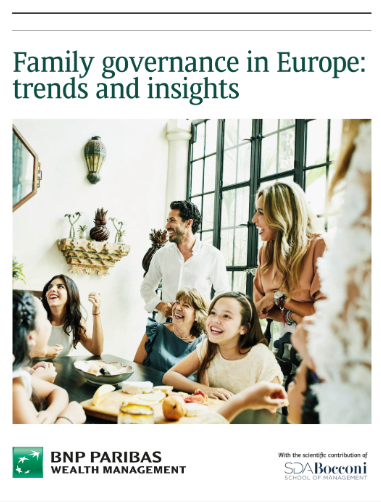BNP Paribas Wealth Management publishes an exclusive report with the SDA Bocconi School of Management, to deep dive into new issues and trends of family business governance in Europe.
In Europe, family firms make up the vast majority of business organisations in European countries, ranging from 61% of the businesses in the Netherlands to more than 80% in Spain, Italy and France. As such, they are a major driver of economic growth, employment, and social development. With the contribution of leading families and entrepreneurs across Europe, this report highlights the distinctive expectations of entrepreneurial families, to guide their managers and advisors in the way they address family governance, a key component of long-term success of family businesses.
KEY INSIGHTS
- 50% of European Union’s GDP is generated by family firms, which represent between 40 and 50% of all European private sector jobs.
- Many successful European companies are family-owned. Almost half of the top 1,000 Italian companies are family businesses. It is 40% in Germany and 28% in France.
- As regards the formalization of family setting, European companies are quite behind their global peers: 59% of global family firms have a board of directors against only 24% in Europe.
- Working with external advisors is crucial to have a balanced, third-party view on complex issues that might affect the family. More than 75% of respondents rely on referrals from the family’s professional network and/or friends when selecting external advisors.
MAIN EMERGING TRENDS
Social Impact
- Impact investing is gaining traction among the next generation members of affluent families. In Europe, 32% of respondents said they plan to donate their resources to charity, a figure pretty much in line with the global average and that also means the necessity for a substantial re-think of governance structures, asset allocation and wealth responsibilities.
- Practising philanthropy results in overall enhanced family dynamics as it can improve the performance of the business, educate and engage family members, besides creating opportunities for both family bonding and to the social context in which the business is established.
Digital Transformation
- Family firms are, on average, more effective than non-family firms in innovating their business model digitally, for example by servicing it or by rolling out a digital platform to convey the value proposition.
- For 72% of European family firms, being more innovative is the top goal in the short to medium term, exceeding those for staff training, product diversification and geographic expansion.
Education for responsible ownership
- Next-generation members are not only important for business continuity, but also for the long-term strategy and transformative adaptation
- Family-owned business tend to involve the next generation pretty early on in the business: in marketing and social media campaign (46%), in integrating sustainable practices into the business (35%) and in the development of new product lines (41%).

“Family firms are the backbone of our European economy. They have proven their resilience and major role in our communities, deploying capital over the long run, and integrating sustainable practices in their daily operations.” commented Pierre Ramadier, Global Head of Entrepreneurs & Families coverage, BNP Paribas Wealth Management. “In light of a more complex and uncertain environment, a well-structured family governance is fundamental for long-term success of family firms. They count on us to accompany them in adopting a distinctive approach to governance suited to their family values, purpose, and business model.”
"Family firms play a significant role in the Italian economy. They are strongly rooted in the territories in which they operate and represent the excellence of Made in Italy both nationally and abroad. In several cases, family members are directly involved in business decisions, in others the top figures are external managers and, therefore, every company needs specialized and customized financial solutions” commented Luca Bonansea, Head of BNL-BNP Paribas Private Banking and Wealth Management. "Thanks to our business model, which integrates all the entities of the BNP Paribas Group into a global approach to customer needs, we support families and businesses in preserving, developing and giving continuity to their corporate assets, with a careful look at innovation, sustainability and new generations".


